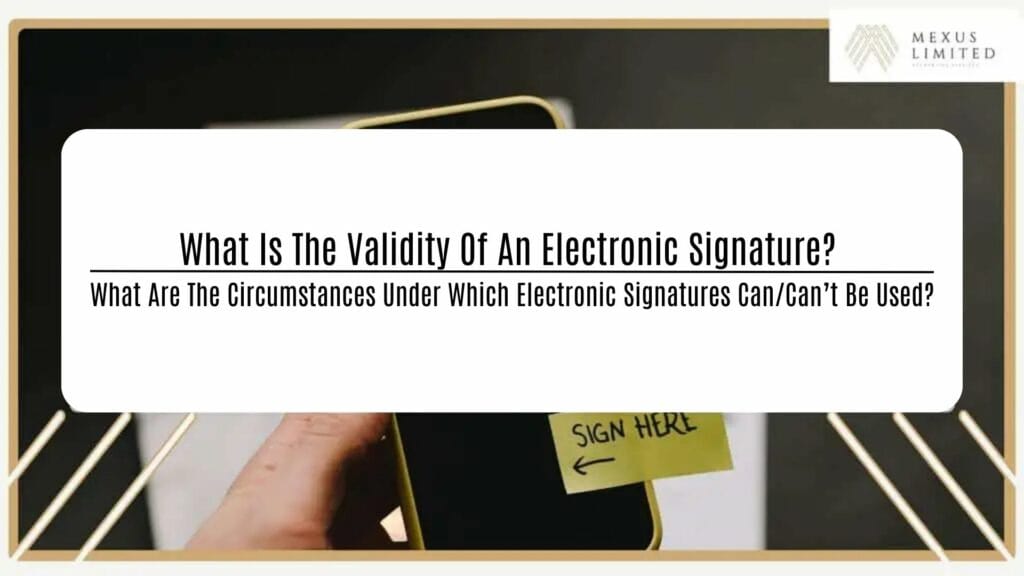What is the validity of an electronic signature? What are the circumstances under which electronic signatures can/can’t be used?

With the advancement of technology and the popularity of the Internet, electronic signatures have become an increasingly important form of signature. However, when using electronic signatures, we need to understand the restrictions and requirements under Hong Kong law. In this article, we will introduce the circumstances under which electronic signatures can be used in Hong Kong, the documents that cannot be signed electronically, and the cautions related to the use of electronic signatures.
How is an electronic signature valid?
In order for an electronic signature to be valid, the Electronic Transactions Ordinance states that the following conditions must be met:
Consent and agreement: Both signatories must agree to use electronic signatures as a means of signing documents, and clearly express this intention.
Signature integrity: Ensure that the signature process has not been tampered with. Electronic signatures should use encryption technology and digital certificates to ensure the security and integrity of the data during the signature process.
Identity verification: To ensure that the identity of the signatory is reliable, the electronic signature system should provide an identity verification mechanism. This can be achieved through email verification, SMS verification, biometric features (such as fingerprints or facial recognition) and other means.
Signature non-repudiation: Electronic signatures need to be non-repudiation, meaning that the signer cannot deny the document has been signed. Usually, this can be achieved by tying the signature closely to the signer’s identification.
Compliance with laws and regulations: Electronic signatures need to comply with the relevant laws and regulations. Different countries and regions may have different regulations on the validity and applicability of electronic signatures, so when using electronic signatures, you need to ensure that they meet the legal requirements of your location.
Hong Kong law does not have specific provisions on the format of electronic signatures. The parties to a transaction may use different methods to implement an electronic signature, such as.
Signing on a document using a touch screen device with a stylus;
Using an online electronic signature tool where both parties browse the document and add their signatures through a unique document signature link.
In what cases can electronic signatures be used?
Electronic signatures can be used to replace traditional paper signatures in commercial contracts, lease agreements, sales contracts, consulting agreements, etc., provided that the above conditions are met.
Specifically, under Hong Kong law, electronic signatures have a wide range of applications and are given the same legal effect as written signatures. It can be used in.
Business-to-business contracts, including confidentiality agreements, purchase orders and invoices;
Consumer agreements, such as sales and service agreements, software licenses, purchase orders, order confirmations, and invoices;
Employee contracts, such as confidentiality agreements, creative rights transfer agreements, privacy statements and employment contracts;
Intellectual property licenses, including copyright, patent and trademark licenses;
Intangible asset transfer agreements.
In what cases are electronic signatures not allowed?
Although electronic signatures are widely recognized and used in Hong Kong, there are some exceptions to their use. Schedule 1 of the Electronic Transactions Ordinance lists a number of documents and contracts that must be signed and cannot be signed electronically, including
Documents relating to final will and testamentary matters, including the creation, amendment and revocation of wills, etc;
Documents relating to trusts, in which acts of creation, alteration, and termination of trusts must be in the form of signatures;
documents of authority, including the creation, alteration and revocation of authority documents must also be in conventional signature;
Documents that are required to be stamped and signed pursuant to the Stamp Duty Ordinance;
Government-approved land tenure agreements, land contracts and government leases;
documents relating to land registration, such as land leases and deeds of assignment
documents relating to interests in real property, including assignment contracts, mortgages and legal charges;
Foreign exchange bills of exchange;
Agreements between real estate agents and their clients;
Official legal statements, affidavits and oaths;
Court orders and documents issued by the government. The above information is provided for reference. If you have any tax return (personal tax return, corporate tax return, accountant tax return) queries or information, you are welcome to contact our professional advisors and we will provide you with a free quote and consultation service later.


